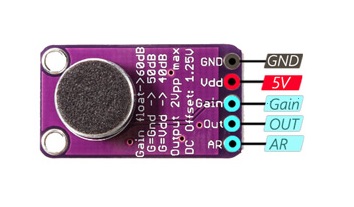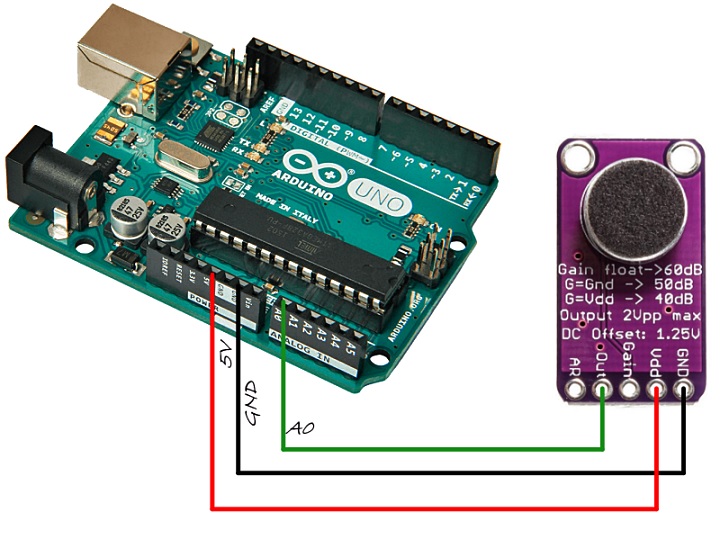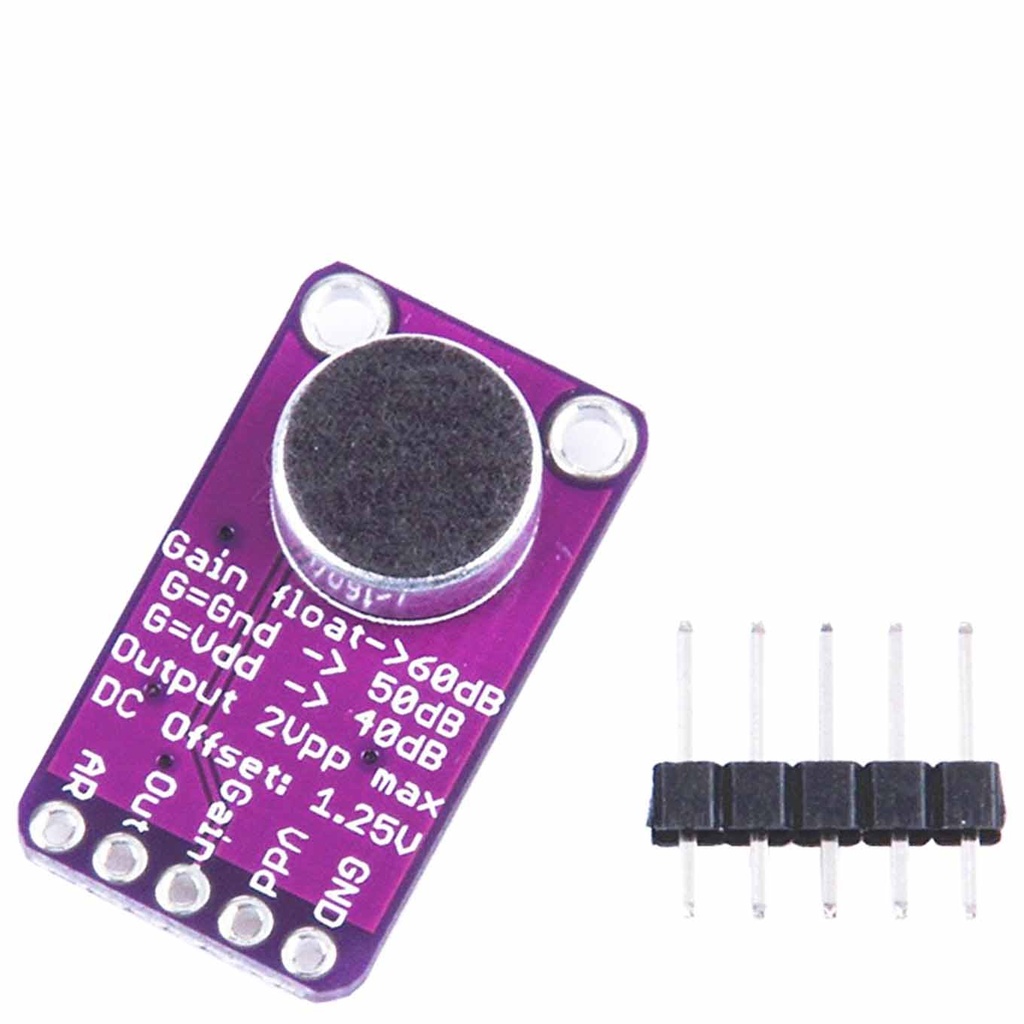Features:
- Integrated Amplifier: Built-in amplifier circuit eliminates the need for external components.
- High-Quality ECM Microphone: Captures clear audio signals from 20Hz to 20kHz.
- Analog Signal Output: Provides a real-time analog signal to microcontrollers or audio systems.
- AUX Output Compatibility: Easily interfaces with AUX input lines in sound systems.
- Low Noise: Minimizes interference, ensuring high-fidelity sound capture.
- Low Power Consumption: Efficient design for battery-powered systems.
- Automatic Gain Control (AGC): Dynamically adjusts the amplification to maintain consistent audio levels.
- Selectable Gain Settings: Supports 40dB, 50dB, and 60dB gain options.
- Configurable Attack/Release Ratio: Fine-tune AGC response to changing sound conditions.
- Simple Analog Interface: No need for digital communication protocols like I2C or SPI.
Description:
The MAX9814 module features a precision amplifier and an ECM microphone that captures audio signals and amplifies them based on the selected gain and AGC settings. The module operates on 2.7V to 5.5V and outputs an analog signal that can be fed directly to an Arduino or any analog input. By default, it uses 60dB gain and a 1:4000 attack/release (AR) ratio. Both can be adjusted using the Gain and AR pins for optimal audio tuning. With a 1.25V DC bias and up to 2Vpp output, the MAX9814 ensures accurate and responsive sound detection.
Principle of Work:
The MAX9814 module uses an ECM microphone to convert sound waves into electrical signals, which are then amplified by the onboard circuitry. The analog signal is available on the output pin and can be read by analog devices or microcontrollers. Gain and AR ratio are hardware-configurable for use in noisy or quiet environments. No libraries are needed—simply read the analog signal using standard code.
Pinout:

| Pin |
Description |
| VCC |
Power input (2.7V – 5.5V) |
| GND |
Ground |
| OUT |
Analog audio output |
| Gain |
Select gain: Disconnected = 60dB, VCC = 50dB, GND = 40dB |
| AR |
Set AR ratio: Disconnected = 1:4000, VCC = 1:2000, GND = 1:500 |
Applications:
- Noise detection systems
- Voice-activated devices and voice assistants
- Audio surveillance and recording
- Baby monitors and security systems
- Speech recognition and voice control
Circuit Connection:

- Connect VCC to 5V
- Connect GND to Arduino GND
- Connect OUT to Arduino analog pin A0
Code Example (Arduino):
const int micPin = A0;
const int sampleWindow = 50; // 50 ms = 20 Hz
void setup() {
Serial.begin(9600);
}
void loop() {
unsigned int maxSignal = 0;
unsigned int minSignal = 1024;
unsigned long startTime = millis();
while (millis() - startTime < sampleWindow) {
unsigned int sample = analogRead(micPin);
if (sample < 1024) {
if (sample > maxSignal) maxSignal = sample;
if (sample < minSignal) minSignal = sample;
}
}
unsigned int peakToPeak = maxSignal - minSignal;
double voltage = (peakToPeak * 5.0) / 1024;
Serial.println(voltage);
}
Technical Specifications:
| Parameter |
Value |
| Supply Voltage |
2.7V – 5.5V |
| Input-Referred Noise |
30nV/√Hz |
| Total Harmonic Distortion (THD) |
0.04% typical |
| Microphone Bias |
2V |
| Output Bias |
~1.25V |
| Output Voltage (Vpp) |
~2Vpp |
| Gain Options |
40dB / 50dB / 60dB |
| AR Ratio Options |
1:500 / 1:2000 / 1:4000 |
| Operating Temperature |
-40°C to +85°C |
Comparisons:
- MAX9814 – Best for high-fidelity audio with AGC, adjustable gain & AR ratio.
- MAX4466 – Basic op-amp mic with manual gain adjustment (25x–125x).
- SPW2430 – Compact MEMS mic with digital I2S output and fixed bias.
Choose the MAX9814 for battery-powered or advanced audio applications where consistent volume and clarity are essential. It outperforms analog-only solutions by dynamically controlling gain and ensuring reliable sound amplification.
Features:
- Integrated Amplifier: Built-in amplifier circuit eliminates the need for external components.
- High-Quality ECM Microphone: Captures clear audio signals from 20Hz to 20kHz.
- Analog Signal Output: Provides a real-time analog signal to microcontrollers or audio systems.
- AUX Output Compatibility: Easily interfaces with AUX input lines in sound systems.
- Low Noise: Minimizes interference, ensuring high-fidelity sound capture.
- Low Power Consumption: Efficient design for battery-powered systems.
- Automatic Gain Control (AGC): Dynamically adjusts the amplification to maintain consistent audio levels.
- Selectable Gain Settings: Supports 40dB, 50dB, and 60dB gain options.
- Configurable Attack/Release Ratio: Fine-tune AGC response to changing sound conditions.
- Simple Analog Interface: No need for digital communication protocols like I2C or SPI.
Description:
The MAX9814 module features a precision amplifier and an ECM microphone that captures audio signals and amplifies them based on the selected gain and AGC settings. The module operates on 2.7V to 5.5V and outputs an analog signal that can be fed directly to an Arduino or any analog input. By default, it uses 60dB gain and a 1:4000 attack/release (AR) ratio. Both can be adjusted using the Gain and AR pins for optimal audio tuning. With a 1.25V DC bias and up to 2Vpp output, the MAX9814 ensures accurate and responsive sound detection.
Principle of Work:
The MAX9814 module uses an ECM microphone to convert sound waves into electrical signals, which are then amplified by the onboard circuitry. The analog signal is available on the output pin and can be read by analog devices or microcontrollers. Gain and AR ratio are hardware-configurable for use in noisy or quiet environments. No libraries are needed—simply read the analog signal using standard code.
Pinout:

| Pin |
Description |
| VCC |
Power input (2.7V – 5.5V) |
| GND |
Ground |
| OUT |
Analog audio output |
| Gain |
Select gain: Disconnected = 60dB, VCC = 50dB, GND = 40dB |
| AR |
Set AR ratio: Disconnected = 1:4000, VCC = 1:2000, GND = 1:500 |
Applications:
- Noise detection systems
- Voice-activated devices and voice assistants
- Audio surveillance and recording
- Baby monitors and security systems
- Speech recognition and voice control
Circuit Connection:

- Connect VCC to 5V
- Connect GND to Arduino GND
- Connect OUT to Arduino analog pin A0
Code Example (Arduino):
const int micPin = A0;
const int sampleWindow = 50; // 50 ms = 20 Hz
void setup() {
Serial.begin(9600);
}
void loop() {
unsigned int maxSignal = 0;
unsigned int minSignal = 1024;
unsigned long startTime = millis();
while (millis() - startTime < sampleWindow) {
unsigned int sample = analogRead(micPin);
if (sample < 1024) {
if (sample > maxSignal) maxSignal = sample;
if (sample < minSignal) minSignal = sample;
}
}
unsigned int peakToPeak = maxSignal - minSignal;
double voltage = (peakToPeak * 5.0) / 1024;
Serial.println(voltage);
}
Technical Specifications:
| Parameter |
Value |
| Supply Voltage |
2.7V – 5.5V |
| Input-Referred Noise |
30nV/√Hz |
| Total Harmonic Distortion (THD) |
0.04% typical |
| Microphone Bias |
2V |
| Output Bias |
~1.25V |
| Output Voltage (Vpp) |
~2Vpp |
| Gain Options |
40dB / 50dB / 60dB |
| AR Ratio Options |
1:500 / 1:2000 / 1:4000 |
| Operating Temperature |
-40°C to +85°C |
Comparisons:
- MAX9814 – Best for high-fidelity audio with AGC, adjustable gain & AR ratio.
- MAX4466 – Basic op-amp mic with manual gain adjustment (25x–125x).
- SPW2430 – Compact MEMS mic with digital I2S output and fixed bias.
Choose the MAX9814 for battery-powered or advanced audio applications where consistent volume and clarity are essential. It outperforms analog-only solutions by dynamically controlling gain and ensuring reliable sound amplification.


